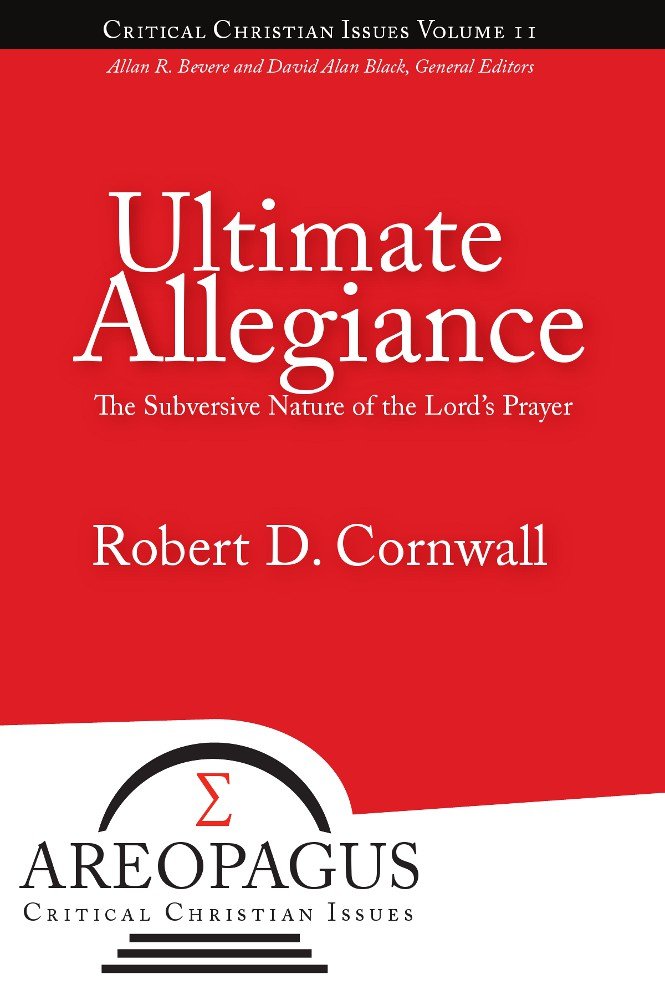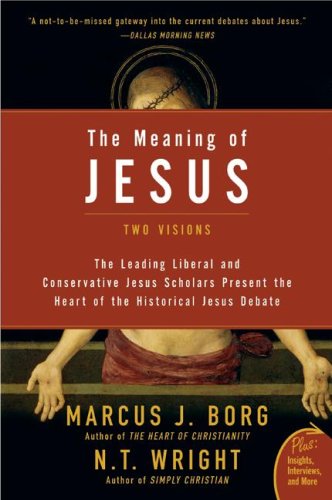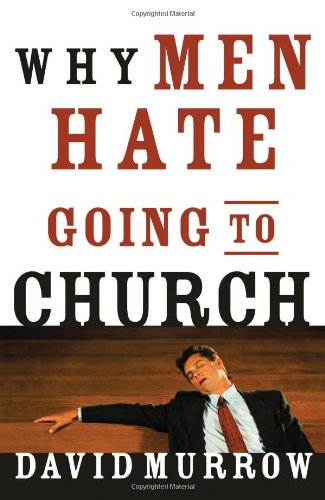Book review: Ultimate Allegiance
by Robert D. Cornwall
★★★★
This little 60-page booklet breaks down the Lord’s Prayer, providing a line-by-line explanation. The provocative subtitle is The Subversive Nature of the Lord’s Prayer, planting images in my mind of a prayer that drives me trembling to my knees, but that isn’t quite the way Robert means it. The preface explains, “Prayer that is subversive is prayer that engages ‘the powers that be.'”
Christians have for a couple thousand years recited this prayer—the Didache advises believers to pray these words at least three times each day—but do we recognize it as a pledge of action on our part, a statement of ultimate allegiance to God’s purpose of establishing a kingdom on earth? The following observation by Robert is critical, particularly with the Lord’s Prayer:
While prayer has a vertical dimension, uniting human beings with the divine, it also has a horizontal dimension. As with the two great commandments, our prayers link us to God and to neighbor.
In this light, the Lord’s Prayer affirms our personal role in inaugurating the Kingdom of Heaven, under God’s guidance. “Thy kingdom come,” we beg, and in so doing, we are accepting an active role alongside our brethren. If we choose to participate in God’s reign, we’re committing ourselves to do God’s will on earth as in heaven, and therefore engaging in the mission of God.

Deuteronomy 22:21, Thou Fool, part II of II
[S]he shall be brought to the door of her father’s house and there the men of her town shall stone her to death. She has done a disgraceful thing in Israel by being promiscuous while still in her father’s house. You must purge the evil from among you.
//In my verse yesterday, Jesus said if you call somebody a fool, you’re on your way to hell. So, I thought I’d provide a bit of ambiance, describing what happened to “fools” in the Old Testament. Here’s another one:
Joshua 7:15, He who is caught with the devoted things shall be destroyed by fire, along with all that belongs to him. He has violated the covenant of the LORD and has done a disgraceful thing in Israel!'”
So, people who disobey the law of God are to be stoned or burned. Probably both … killed with stones, then the body destroyed by fire. But what does this have to do with fools? We go back to the promise of Jesus in Matthew 5:21, the verse I quoted yesterday. Say to your brother, Raca, and you might have to go before the judge (Raca is an expression of contempt, like calling him stupid.) But say Thou Fool, and you’re in danger of hell fire.
It’s our interpretation that makes this hard to understand. “Thou fool” sounds quaint next to “hey, stupid!” But the Greek word translated “fool” actually speaks of something far more sinister than mere stupidity. Think of it as someone practicing idolatry or worse. It’s no sin to be stupid, but it’s a sin to be stupid about God’s directives. That’s why the fool says in his heart, “There is no God.” (Psalm 14:1) … not because he’s an idiot, but because he justifies his sin with unbelief.
Which brings us to another point. When Jesus promised “hell fire,” the Greek word he used was Gehennah, which is not hell at all. It’s a once-pleasant valley on the south side of Jerusalem, but which drew the disfavor of God because of idolatry practiced there. Gehennah eventually evolved into a garbage dump that burned perpetually, a sort of fiery symbol for contemptuous destruction. The King James version of the Bible leaped to the conclusion that Jesus was speaking symbolically of eternal damnation, but scholars continue to argue about just what this image of Gehennah was meant to convey. A closer translation than eternal punishment might be the promise in Joshua 7:15, above, where the punishment is to be killed, and the body burned … exactly how the valley of Gehennah was once used; as a fiery disposal of the bodies of the enemy.
We may never grasp just what this distasteful image of Gehennah was meant to convey. But if I were you, I’d stick to just calling my brother stupid.
Matthew 5:22, Thou Fool, part I of II
But I say unto you, That whosoever is angry with his brother without a cause shall be in danger of the judgment: and whosoever shall say to his brother, Raca, shall be in danger of the council: but whosoever shall say, Thou fool, shall be in danger of hell fire.
//Pretty strong words coming from Jesus. Call somebody a fool, and you’re headed for hell. Now, check out the following passage, also in Matthew, and also the words of Jesus:
Woe unto you, ye blind guides, which say, Whosoever shall swear by the temple, it is nothing; but whosoever shall swear by the gold of the temple, he is a debtor! Ye fools and blind: for whether is greater, the gold, or the temple that sanctifieth the gold?
Hey, what’s going on? Is Jesus headed to hell for calling people fools? Or did Matthew forget what he promised a few chapters earlier? I’ll let you worry about this overnight, and return to the topic tomorrow.
Book review: The Meaning of Jesus
by Marcus J. Borg and N. T. Wright
★★★★★
Two of my favorite scholars, Marcus Borg and N. T. Wright, debate the meaning of Jesus. One is decidedly more conservative, but both are thoughtful and well-studied. And, raising hope for the future of Christianity, I would venture a guess that they are best friends despite their differences.
Wright believes the gospels are what they are “because their authors thought the events they were recording—all of them, not just some—actually happened.” This may sound self-evident to conservative Christians, but it is not the way Borg sees it. Two terms he uses to describe gospel writing are “metaphor historicized,” and its complement, “history metaphorized.” Borg just can’t jump on board with a literal reading of the gospels; he describes this outdated way of reading the Bible with five adjectives: literalistic, doctrinal, moralistic, exclusivistic, and afterlife oriented. This view, he says, has ceased to work for a large number of people, who find that if they must take the Bible literally, they cannot take it at all.
According to Borg, the “single most important difference” between these two scholars is their opinion about whether or not Jesus saw himself as the messiah. Wright says yes, Jesus understood his role as central to the salvation of the Jewish nation and, by extension, the world. Borg says no, Jesus’ role as messiah grew after his death and resurrection, as the understanding of his followers evolved.
In my opinion, the single most important difference in the thinking of these two scholars is not Jesus’ self-understanding, but the manner of his resurrection. Wright says Jesus rose in body, and showed himself physically to his disciples. Never mind that this new body could somehow walk through walls and disappear at will. “Resurrection,” to a Jew, meant a physical rising in body. Wright argues that only an event of this magnitude could have triggered the devotion and dedication of the Jesus movement that continued on after his death. In contrast, Borg seems unconcerned with the empty tomb, and interprets the resurrection in a more spiritual manner. I’m oversimplifying his position, but Borg sees Jesus being “raised to God’s right hand” as simply meaning Jesus has captured the position of Lord in the lives in his disciples. He is “raised up” by his followers after his death.
As I said, these are two of my favorite Jesus scholars. I believe Borg and Wright encapsulate liberal and conservative Christianity at their basic levels, and studying the two in tandem helps us appreciate the arguments of both sides. Great book!

Luke 9:28-31 The Second Exodus
And it came to pass about eight days after these sayings, [Jesus] took Peter and John and James, and went up into a mountain to pray. And as he prayed, the fashion of his countenance was altered, and his raiment was white and glistening. And, behold, there talked with him two men, which were Moses and Elias: Who appeared in glory, and spake of his decease which he should accomplish at Jerusalem. (KJV)
//Here’s a puzzle for you. There’s one word I want to emphasize in today’s verses. It’s the word “decease.” Jesus spoke of his “decease,” which he should “accomplish” at Jerusalem.
Sounds logical—that’s where Jesus went to die on the cross—but most current versions of the Bible translate this word differently. Most read “departure,” not “decease.” The King James version, and a couple others, naturally assume that Jesus’ “departure” means his death, since that’s what they see being “accomplished” in Jerusalem. So they translate the word into “decease.”
The New Living Translation actually contains the correct translation … by realizing that the word needs no translating at all. The original Greek word is exodos, translated “exodus,” which does indeed mean “departure” … but which is also pregnant with meaning. We, today, equate the word exodus with Israel’s escape from Egypt, when Moses led God’s people to the promised land … and you can be sure that today’s verses’ original reference to the exodus would have been recognized just as plainly by first-century readers. Jesus planned to accomplish an exodus in Jerusalem, just like the one in Egypt.
So, apparently, the reference to Moses in this passage is not coincidental. Many Jews expected the coming Messiah figure to be patterned after Moses, and many anticipated some sort of second exodus. So, in this verse, as Jesus plans his trip to Jerusalem with Moses, he appears to be not leaving his disciples, but leading them to a new land! But that begs the obvious question: Where is he leading them?
Genesis 29:17, Leah’s Eyes
Leah was tender eyed; but Rachel was beautiful and well favoured.
//You know the story. Jacob has gotten ahead in life through trickery, deceiving both his brother and his father at different times, and now he gets a taste of his own medicine. He agrees to serve a man named Laban for seven years in exchange for his daughter, Rachel. Laban had two daughters; Leah was “tender eyed,” but Rachel was beautiful, and Jacob loved Rachel.
“Tender eyed” is the King James translation. Other translations are not so kind. The most common translation is that Leah had weak eyes, though other versions call her eyes blue (apparently a real turn-off), or dull, or soft, or lacking sparkle. Bishop John Shelby Spong interprets the text to mean she had “eyes that popped out of her head like those of a cow.” Whatever the true meaning—the text is indeed difficult to translate—it’s clear there was no compliment intended.
As the story goes, Jacob works seven years for Laban, who then awards him his daughter, and Jacob consummates their marriage, only to wake up next to his wife in the morning to find … Leah! He has taken to wife the daughter with ugly eyes! This bit of chicanery on the part of Laban is taken in stride by Jacob—after all, deception is only the way of life he knows—and he agrees to serve Laban another seven years for the second daughter. We’re told she was worth it.
(p.s., Don’t be distressed about poor Jacob. In the end, he devises a nasty plot to steal the best of Laban’s herds, and thus gets the best of Laban after all.)
Got an opinion? 7 commentsBook review: Why Men Hate Going to Church
by David Murrow
★★★★★
I have a confession to make. I accepted this book for review thinking it might be good for a few laughs. Get a guy through the church doors? What are you gonna do, turn it into a sports bar?
I was wrong about David’s book. Oh, I laughed alright—a lot!—but all the time I was chuckling, I was nodding. David has nailed it.
Funny thing is, speaking as a guy, we don’t know why we hate church. We just know it’s uncomfortable. The awkwardness has to be explained to us … and when it is, we finally nod knowingly.
David probably thinks his book is for pastors. No, it’s for couples. Ladies, if you want your guy sitting next to you in the pew, read this. Then find a new church together. One where the pastor has read the book, too.

Acts 2:38, The Meaning of Baptism
Then Peter said unto them, Repent, and be baptized every one of you in the name of Jesus Christ for the remission of sins, and ye shall receive the gift of the Holy Ghost.
//Today’s post isn’t meant to instruct or entertain, but to pose a question. I’m not a scholar of current-day religion, so help me out, here. In my observation, baptism is a step that nearly all Christians agree is important, but few agree entirely on its meaning. Perhaps its meaning is meant to be obscure, something personal between the initiate and God. I remember my own baptism as a teenager with a bit of confusion. It seemed to be mostly an initiation into the church, a way for the church to accept me into its ranks, and it had something to do with asking me to cut my hair, which had apparently grown too long for a nice Christian boy. Odd, the things I remember.
So why do we baptize? Can we draw some idea of this ritual’s meaning from the New Testament? John the Baptist portrayed baptism as a necessary repentance. Paul saw baptism as a reenactment of the death and resurrection of Christ. The book of Acts associates it with the remission of sins. John’s Gospel seems to consider it an antiquated picture of spiritual rebirth, and takes pains to point out that Jesus never performed any water baptisms; the new baptism of the Kingdom would be by fire and Spirit, not water.
How about if we dig deeper, going back to pre-Christian scripture? How about Isaiah 4:4, referring to seven sinful women: The Lord will wash away the filth of the women of Zion; he will cleanse the bloodstains from Jerusalem by a spirit of judgment and a spirit of fire. Or Ezekiel 36:25-26: I will sprinkle clean water on you, and you will be clean; I will cleanse you from all your impurities and from all your idols. I will give you a new heart and put a new spirit in you; I will remove from you your heart of stone and give you a heart of flesh. In both these cases, “baptism” is a cleansing performed by God alone, with spirit.
We can find parallels to Christian baptism in the practices of the Essenes, and in the rebirth ceremonies of mystery cults, but it is its Christian interpretation that eludes me. I’d be curious to hear your opinion.
1 Corinthians 11:8, Why men get to be the boss
For man did not come from woman, but woman from man;
//Women are probably more familiar with the Apostle Paul’s instructions in 1 Corinthians 11 than men, precisely because this is the chapter that demands women be in subjection to men. “Now I want you to realize that the head of every man is Christ, and the head of the woman is man, and the head of Christ is God.”
Why is this necessary? It goes back to Adam and Eve, according to Paul. Not so much that Eve was the cause of man’s downfall, but that Adam came first, and woman was made from man … not vice versa. Eve was constructed out of a rib removed from Adam’s side. Strange biology indeed, but if it makes me the boss, I can live with it.
Paul’s theology lasted 1500 years! When Vesalius in 1543 showed that the number of ribs was the same in males and females, it created a storm of controversy … and ruined a good thing.
Book review: Gilgamesh, A New Rendering in English Verse
by David Ferry
★★★★★
Gilgamesh is the story of a legendary Mesopotamian king who embarks on a quest for immortality. The Gilgamesh Epic has two primary claims to fame: (1) it may be the oldest surviving written story on earth, and (2) it contains a passage eerily similar to the story of Noah and the Ark. A man builds a big boat, saving his family and lots of animals from a monstrous flood. Like Noah, the flood survivor in Gilgamesh sends out birds (a dove, then a swallow, then a raven) from his “ark” after the rain stops to see if there is dry land anywhere. Like Noah, after exiting the ark he offers a sacrifice to the gods.
Ferry’s interpretation is not really an interpretation; it is a retelling based on other scholars’ translations. It’s a poetic rendition meant to artistically recreate the flavor of the original cuneiform, but in English. The preface calls Ferry’s work “verbal art.” He does take liberties here and there, most times because all of our copies of the Gilgamesh story are fragmentary, even after piecing them together. Yet, he makes a strong effort to be respectful of the best scholarly translations, thus remaining as true to the original as “feasible” (his word).
I haven’t studied any other translations so I can’t vouch for the authenticity of Ferry’s version, but I certainly enjoyed reading it!
















 354 Circles
354 Circles
 603 Goodreads Friends & Fans
603 Goodreads Friends & Fans

 Hello! I'm an author, historical Jesus scholar, book reviewer, and liberal Christian, which means I appreciate and attempt to exercise the humanitarian teachings of Jesus without getting hung up on any particular supernatural or religious beliefs.
The Bible is a magnificent book that has inspired and spiritually fed generations for thousands of years, and each new century seems to bring a deeper understanding of life’s purpose. This is true of not only Christianity; through the years, our age-old religions are slowly transforming from superstitious rituals into humanitarian philosophies. In short, we are growing up, and I am thrilled to be riding the wave.
I avidly read all thought-provoking religion titles. New authors: I'd love to read and review your book!
Hello! I'm an author, historical Jesus scholar, book reviewer, and liberal Christian, which means I appreciate and attempt to exercise the humanitarian teachings of Jesus without getting hung up on any particular supernatural or religious beliefs.
The Bible is a magnificent book that has inspired and spiritually fed generations for thousands of years, and each new century seems to bring a deeper understanding of life’s purpose. This is true of not only Christianity; through the years, our age-old religions are slowly transforming from superstitious rituals into humanitarian philosophies. In short, we are growing up, and I am thrilled to be riding the wave.
I avidly read all thought-provoking religion titles. New authors: I'd love to read and review your book!
 Hi! While Lee writes the articles and reviews the books, I edit, organize, and maintain the blog. The views expressed here are Lee's but I'm his biggest supporter! :-)
Hi! While Lee writes the articles and reviews the books, I edit, organize, and maintain the blog. The views expressed here are Lee's but I'm his biggest supporter! :-)
Connect With Me!